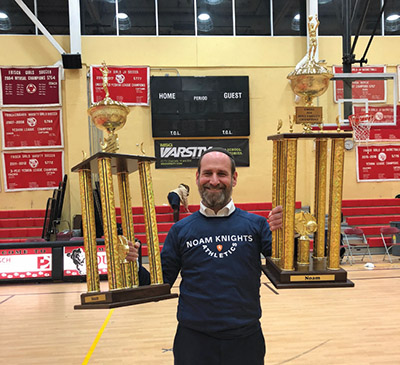
Like any community, drug addiction and alcoholism are problems that continue to plague Jews across the world. A person who especially knows the effects of this epidemic is Teaneck’s Michael Levin, who, 30 years ago, lost a dear friend to heroin addiction. Levin is an author and ghostwriter, and his new book, “Jews and Booze: Alcoholism, Addiction, and Recovery in the Jewish Community,” dives deep into these issues, while also offering ways the Jewish community can proactively help people facing these struggles.
As a writer and editor, Levin has had a hand in the creation of over 900 books throughout his career. He’s written for famous athletes, celebrities, broadcasters, business people, doctors and dentists—anyone who has a positive message to share with the world. When he’s not writing, he’s an active member of the Teaneck Jewish community. As he sees it, the addiction issue is such a big one because it is not often discussed and is instead swept under the rug.
“This is not a gentile problem: it’s an ‘everyone’ problem,” Levin shared with The Jewish Link. “We as Jews like to think that in some ways we’re separate from the rest of the world, that we’re insulated from many of the problems others face. But the truth is we’re very much like the rest of the world, and the longer we go without acknowledging the problem of alcoholism and addiction in our communities, the worse it’s going to get.”
Levin was driven to write his new book after losing his friend David, a young man from a religious Brooklyn family, an experience that still haunts him.
“His death was, and remains, a huge trauma for me,” Levin said. “Because it was pointless, and I keep telling myself it was preventable. But in our community, there are no-talk rules about this, and David didn’t feel safe or comfortable explaining what was happening. It’s seen as a shame and an embarrassment to come out as an addict. As hard as it can be to get over addiction, it’s even harder to do so with community bias.”
After David’s passing, Levin worked as a volunteer peer counselor, working with families and individuals in and out of the Jewish community facing these struggles. He saw firsthand how the epidemic has affected families, and even coined a phrase for a certain phenomenon that occurs for some Jews when dealing with these subjects.
“In the book, I call it the Star of David Syndrome,” he said, “where the mark of Jewishness is used as a shield against addiction. ‘Because a person is a Jew, we don’t need to worry about these things; they don’t happen to us.’ But we are just as prone to the causes that underlie addiction as anyone else. The good thing is that the same solutions that work for other people also work for Jews, like 12-step programs.”
One person he interviewed while doing research especially made an impression. The man, an Orthodox Jew, was involved in a carpool group, and he would find himself drinking while driving. The man decided to get sober, but once he announced that he was becoming a member of Alcoholics Anonymous, he was kicked out of the carpool.
“It just blows my mind to think about,” Levin said. “These people were OK with him driving drunk, but when he explained that he was trying to clean himself up, only then did the group decide they wouldn’t associate themselves with him. It’s just sad, how even when a person wants to fix their lives, these biases show up.”
Denial runs deep, according to Levin: People don’t want to come to terms with accepting that their own friend or family member has a problem. While he feels the community has gotten better at telling the truth about themselves, he said, “There’s still a stigma attached acknowledging these issues. If people can’t ask for help, we are essentially giving them a death sentence.
“I don’t want anyone else to die like my friend, with a needle in his arm. These problems don’t solve themselves, and there’s no shame in having a problem. These deaths are preventable, and we have to be proactive to resolve the underlying issue. We harm ourselves when we don’t tell the truth.”
If you or someone you know is struggling with addiction, you can call SAMHSA’s National Helpline at 1-800-662-HELP (4357). “Jews and Booze” will be released on November 1 and will be available for purchase on Amazon.
Adam Samuel is a journalist from Teaneck. He blogs at www.adamssoapbox.com.











